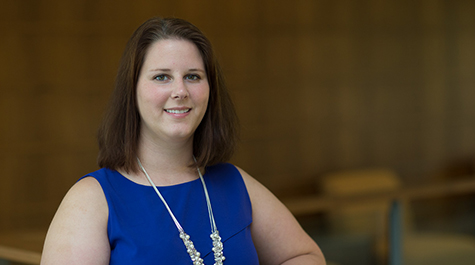Flourishing in a Relentless World
"When we talk about work-life balance, we should really be talking about harmony," says Kelly Crace, Associate Vice President for Health & Wellness at William & Mary and developer of the Life Values Inventory.
Through the fall semester, on Friday afternoons, counseling students gathered with Crace for a "Flourishing in a Relentless World" discussion series, during which Crace and colleagues provided students with tools to help them flourish in their careers. The discussion series is part of the Authentic Excellence Initiative, which seeks to facilitate William & Mary students’ understanding of resilience and flourishing.
This is a series Crace brings to students in the various professional schools within William & Mary as needed.
"One of the things we found out when the new Wellness Center was coming online, after some assessment years ago, was that we wanted to target graduate students with what we offer. So often, they stay siloed in their buildings because the programs are so intense," Crace explained. "We started thinking of ways we could go out to them, to bring wellness to them."
His presentations to other professional schools were noticed by counseling students.
"I first heard about Dr. Crace after he had given a presentation at the Mason School of Business," explained Lauren Reckling, M.Ed. '19, co-vice president of professional development for the counseling students’ honor society, Chi Sigma Iota. "I spoke with Amber Butler, my co-vice president, and we both agreed this would be a fantastic opportunity. I reached out to him and set up a meeting where it became clear that his work on resilience and flourishing would greatly benefit not only counseling students, but the clients and students they serve as well."
Crace, Butler, and Reckling decided to offer a series of workshop-style meetings on Friday afternoons for counselors to dig more deeply into the implications of their values for themselves and for their work.
As Crace views it, one of the goals of the series is to challenge myths of the current culture. For example, he said, common wisdom that work-life balance should be a priority may in fact be harming us.
"People who flourish focus on work-life harmony. If what you are doing during the day is related to your values and what you believe to be right that day, great. Next day, wipe the slate clean. If we are constantly striving for balance, we are constantly frustrated. We either blame ourselves, or we blame the world," he said.
"Many people know they have values, but rarely do people sit down to think about what their values actually are. Consciously thinking about what makes each of us tick helps us gain greater insight into ourselves and is one way to prevent burnout," explained Reckling, adding that this is particularly important for people in the helping professions, where burnout is common.
Using the Life Values Inventory as well as his insight and experience in the field, Crace has been guiding the participating counseling students through a careful assessment of their own values as they apply to counseling work and their lives. The inventory provides information about which values have greatest significance to an individual. Crace and his team enhance the inventory with a series of questions to help participants think through how their lives are or are not manifesting their values.
"The first paradigm shift is moving from values clarification to values relationship. What we've found is that human beings are naturally motivated by fear and comfort. But the deepest form of motivation is values. Your values will override fear and fatigue, but only if you have a relationship with your values," he pointed out, adding that people who flourish do the same things with their values. "One to two times a year, they reflect on what matters to me, how is that alive in my life, and how would people know that?"
The second step is to consider how values appear in your life when they are healthy, and how they might appear when they are out of balance.
Reckling said the discussions were relevant for her both personally and for her work.
"In counseling, we often talk about values and helping clients live more congruently with them, but Dr. Crace has given me a deeper understanding of values work that I can use with clients. I teach a stress management group at my internship, but felt like I wasn't teaching anything meaningful to my clients. That is, until I went to Dr. Crace's workshops," said Reckling, who is completing her training as a clinical mental health and substance abuse counselor.
The conversation is ongoing, with more workshops planned for the spring.
"Sometimes we get a large attendance, sometimes a small one, but it doesn’t matter because whoever is there, is there for a reason," said Crace.
According to Reckling, "Chi Sigma Iota would love to have Dr. Crace back again to share his work with even more students. If interested please contact her at [[e|lreckling]] or Amber Butler [[e|apwebb]]."
